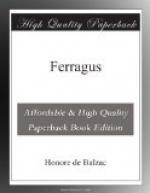So, at the moment of which we speak, all the world was building or pulling down something,—people hardly knew what as yet. There were very few streets in which high scaffoldings on long poles could not be seen, fastened from floor to floor with transverse blocks inserted into holes in the walls on which the planks were laid,—a frail construction, shaken by the brick-layers, but held together by ropes, white with plaster, and insecurely protected from the wheels of carriages by the breastwork of planks which the law requires round all such buildings. There is something maritime in these masts, and ladders, and cordage, even in the shouts of the masons. About a dozen yards from the hotel Maulincour, one of these ephemeral barriers was erected before a house which was then being built of blocks of free-stone. The day after the event we have just related, at the moment when the Baron de Maulincour was passing this scaffolding in his cabriolet on his way to see Madame Jules, a stone, two feet square, which was being raised to the upper storey of this building, got loose from the ropes and fell, crushing the baron’s servant who was behind the cabriolet. A cry of horror shook both the scaffold and the masons; one of them, apparently unable to keep his grasp on a pole, was in danger of death, and seemed to have been touched by the stone as it passed him.
A crowd collected rapidly; the masons came down the ladders swearing and insisting that Monsieur de Maulincour’s cabriolet had been driven against the boarding and so had shaken their crane. Two inches more and the stone would have fallen on the baron’s head. The groom was dead, the carriage shattered. ’Twas an event for the whole neighborhood, the newspapers told of it. Monsieur de Maulincour, certain that he had not touched the boarding, complained; the case went to court. Inquiry being made, it was shown that a small boy, armed with a lath, had mounted guard and called to all foot-passengers to keep away. The affair ended there. Monsieur de Maulincour obtained no redress. He had lost his servant, and was confined to his bed for some days, for the back of the carriage when shattered had bruised him severely, and the nervous shock of the sudden surprise gave him a fever. He did not, therefore, go to see Madame Jules.
Ten days after this event, he left the house for the first time, in his repaired cabriolet, when, as he drove down the rue de Bourgogne and was close to the sewer opposite to the Chamber of Deputies, the axle-tree broke in two, and the baron was driving so rapidly that the breakage would have caused the two wheels to come together with force enough to break his head, had it not been for the resistance of the leather hood. Nevertheless, he was badly wounded in the side. For the second time in ten days he was carried home in a fainting condition to his terrified grandmother. This second accident gave him a feeling of distrust; he thought, though vaguely, of Ferragus




